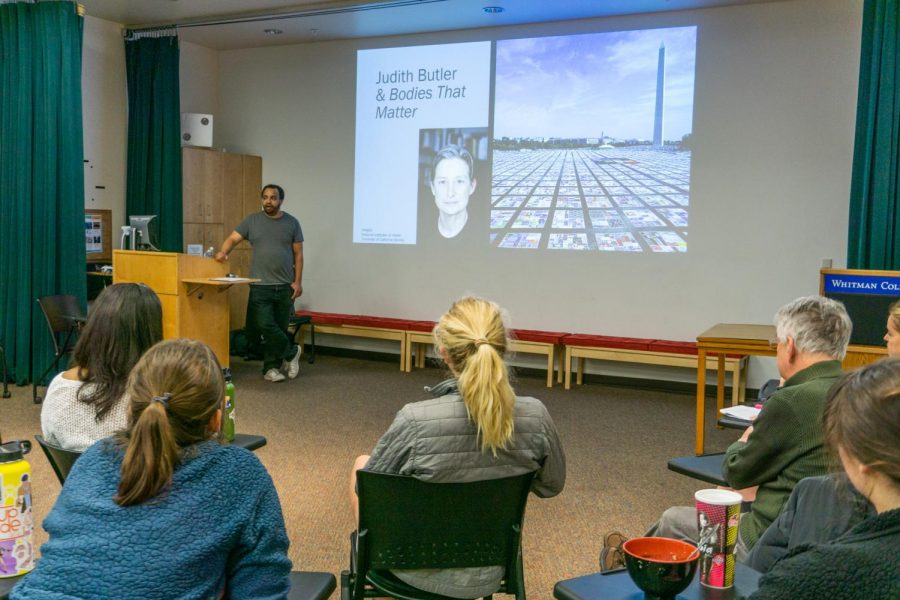“Black Bodies that Matter”: Whitman alum starts conversations about race
Dr. James Garrison graduated from Whitman in 2004 and returned this past week to speak to the community about the meaning of the black body in our current sociopolitical climate.
October 28, 2019
This past Thursday, Oct. 24, in Olin Hall, Whitman alum Dr. James Garrison ’04 addressed the significance applied to the black body with the backdrop of the Black Lives Matter movement and how art and culture can affect that perception in a talk titled “Black Bodies That Matter.”
Julia Ireland, Associate Professor of German Studies and Philosophy, worked with the Student Engagement Center (SEC) to co-sponsor this event with the philosophy department. The SEC works with different academic departments to bring back accomplished alumni to present on the work they have done in their area of study and talk to current students about life after Whitman.
The “Black Bodies That Matter” talk is the second part of a series on this subject matter, the first being a discussion-based event on how to start and sustain conversations about race.
Dr. Garrison graduated from Whitman with a major in philosophy and a minor in German studies. He continued on to study East-West comparative philosophy and received an M.A. at the University of Hawai’i Manoa. Garrison completed a Chinese language certification before attending the University of Vienna to complete his Ph.D. in philosophy.
Garrison was a student of Ireland during his time at Whitman, and she feels a great sense of pride in bringing him back to campus to present on this topic and start a conversation.
“One of the things I hear back in the Philosophy department is students just want to know more about race, how to talk about race, how to deal with the difficulties and the emotions of talking about race,” Ireland said. “So I felt that it was particularly well time to bring back not just an alumnus, but an African-American alum who is so accomplished as part of being able to have that conversation.”
Garrison describes his talk as exploring conceptual interpretations of coping with the lack of meaning given to black bodies.
“The name of the talk is ‘Black Bodies That Matter’ and it’s kind of linking up work done by the queer theorist Judith Butler and her book, ‘Bodies That Matter,’ that came out in the early nineties and dealing with the disparities with how gay people didn’t matter in terms of death and memorials… and extending that framework to what’s happening with Black Lives Matter nowadays,” Garrison said. “What I’m trying to do with it is going a little past the historical account of black people…but looking at it in terms of…conceptual dynamics.”
Garrison suggests that art and culture can function as responses to foundational trauma experienced by marginalized populations.
“I suppose if the [audience] took anything from it, maybe just the idea that there is certain engagement with art and culture in response to this dynamic. That the body itself can speak … the idea that there’s a world beyond power structures. That the body and art in a way can serve as at least partial antidotes … ” Garrison said.
First-year Olivia Myers decided to attend “Black Bodies that Matter” as well as the first discussion-based event in this series because of her general interest in philosophy . She recognizes the inaccessibility of the subject matter of the field and appreciated Garrison’s plans to make his work more accessible in the future.
“The formal discussion idea was good, and making this idea of race and identity a topic to be in a conversation is really important in establishing that we are here to be talking with one another about these issues and concepts,” Myers said. “Because we come from such different relative backgrounds, it is so … much better of a resource to draw ideas from to have discussions rather than being a deterrent to having those conversations at all.”
Ireland reflected on how a speaker influenced her own academic pursuits during her time at Whitman and spoke on the power a speaker can have, not only for students but as an enriching event for faculty as well.
“Here is somebody who has this unusual mind and this intellectual trajectory, who is a person of color, who is first-gen, and it’s just that sense of ‘he’s doing something cool, I want to go be that,’” Ireland said.
First-year Devon Player believes that the subject matter Dr. Garrison presented on is particularly impactful for a small liberal arts community.
“Learning the vocabulary and language we can use to have those discussions is really important,” Player said. “I think just hearing people from different perspectives is important so that we’re not stuck in the ‘Whitman Bubble,’ as I’ve heard a lot of people say. It’s [valuable] to be able to talk about that topic within the bubble but to also think about the implications of the world outside of Whitman.”
Garrison credits Whitman as a jumping-off point for the rest of his career, emphasizing that the work he did in college, within the “bubble,” was the start of something larger.
“There’s a big world outside that bubble,” Garrison said. “Me being able to do everything that I have, a large part of it owes to stuff that happened here. Take advantage of your time here.”





